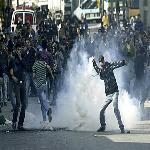17 March 2010

Photo: AP
A Palestinian youth throws back a tear gas canister during clashes near the Kalandia checkpoint between the West Bank city of Ramallah and Jerusalem, 17 Mar 2010
Israel has eased restrictions on Palestinians after violent clashes in Jerusalem eased. The move comes amid a diplomatic crisis between the Israel and the United States.
Israel lifted a tight closure on the West Bank and reopened the Mosque of al-Aqsa compound in Jerusalem's Old City, the site Jews call the Temple Mount. Israel had imposed the clampdown amid several days of violent clashes in Jerusalem between Israeli police and Palestinian stone throwers.
Tensions soared this week after Israel rededicated an ancient synagogue in the Old City. Palestinians said it was an Israeli attempt to destroy the nearby al-Aqsa Mosque and rebuild the biblical Temple. Islamic militants called for a day of rage Wednesday in Jerusalem, but 3,000 Israeli police and soldiers contained the violence. As Israel lifted the restrictions, Jerusalem returned to normal.
Palestinians are also angry about Israel's announcement to build 1,600 Jewish homes in disputed East Jerusalem, which they claim as the capital of a future Palestinian state.
The announcement came during last week's visit of U.S. Vice President Joe Biden. That sparked a serious crisis in relations between Israel and Washington, which sees the settlements as an obstacle to peace. Senior U.S. officials publicly described the announcement as an insult, and the administration is demanding that Israel cancel the settlement project to repair the damage.
Israeli analyst Dan Diker says the U.S. reaction was counterproductive.
"I would suggest that it was the American overreaction now that is inflaming the violence,” said Diker. “It really plays into the agenda of Muslim extremists; they felt, those that were initiating the violence, that they were actually backed by the United States', you know, slap toward Israel."
In the West Bank, Palestinian President Mahmoud Abbas welcomed the U.S. criticism of Israel.
He called on Israel to agree to American demands to halt settlement construction to clear the way for indirect peace talks.
So Israeli Prime Minister Benjamin Netanyahu faces a dilemma. He wants to save Israel's all-important relations with the U.S. But he also says that no Israeli prime minister has ever agreed to stop building in East Jerusalem because it is part of the capital of the State of Israel.